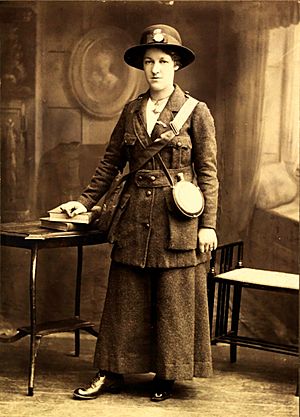Rose McNamara facts for kids
Quick facts for kids
Rose McNamarra
|
|
|---|---|

Rose McNamara in uniform, c. 1916
|
|
| Born |
Rose McNamara
10 September 1885 Dublin, Ireland
|
| Died | 6 March 1957 Dublin, Ireland
|
| Nationality | Irish |
Rose McNamara was an important Irish woman who lived from 1885 to 1957. She was a strong supporter of Ireland's independence and played a big role in a major event called the Easter Rising in 1916. She was a leader, known as a Vice Commandant, during this time.
Contents
Rose McNamara's Early Life
Rose Anne McNamara was born in Dublin, Ireland, on September 10, 1885. Her father, Benjamin McNamara, was a van driver, and her mother was Johanna Mangan. Rose was only 15 years old when her father passed away in 1898.
Around 1906, Rose was introduced to a group called Inghinidhe na hÉireann by her friend Marie Perolz. This group worked to promote Irish culture and independence. Rose also joined Sinn Féin, a political party that wanted Ireland to be free from British rule.
Later, she became a member of Cumann na mBan, a women's organization that grew out of Inghinidhe na hÉireann. With Cumann na mBan, Rose took part in public parades and demonstrations. She learned how to make first aid bandages for wounded people and helped collect money. This money was used to buy supplies and equipment for the Irish Volunteers, a group of men who were preparing to fight for Ireland's freedom.
Role in the Revolution
Preparing for the Easter Rising
On Good Friday in 1916, Rose McNamara and other women from Cumann na mBan worked hard to prepare first aid dressings. These were needed for anyone who might get hurt during the planned uprising.
On Easter Monday, Rose's group from Cumann na mBan marched in their uniforms to Emerald Square. There, they received their instructions from a leader named Éamonn Ceannt. Rose became the Vice Commandant of her group. They were stationed at the Marrowbone Lane garrison, which was located in Jameson's Distillery.
During the Easter Rising
During the Easter Rising, Rose McNamara had several important jobs.
- She worked as a quartermaster, which meant she was in charge of supplies for the men.
- She also acted as a spotter for the snipers, helping them find their targets.
- Rose made sure there were nursing facilities ready to care for anyone who was wounded.
On Sunday, April 30, the fighters were told that the uprising was over and they had to surrender. The British allowed the women to leave, thinking they were less important. However, Rose McNamara refused to go. She and the other women of Cumann na mBan marched alongside the male Volunteers. They were all arrested and sent to prison.
While they were being taken to Richmond Barracks, Rose and the other women sang. They were right behind leaders like Commandant Thomas McDonagh and John MacBride. Major MacBride told them, "Sing away, girls. You'll be alright. You'll be out tomorrow." Rose asked him about the men, and he sadly replied, "Ah no. We won't be out. We'll be shot."
While imprisoned in Kilmainham Gaol, they could hear the sounds of the men being executed, just as MacBride had predicted.
After the Rising
After the Easter Rising, the members of Cumann na mBan were sad but kept working. They collected money to help the families of the prisoners. In 1917, Rose McNamara became the First Lieutenant of her branch. They started military drills and training again. In 1918, Rose and her branch were involved in activities against conscription, which was a plan to force Irish men to join the British army.
During the Irish War of Independence, Rose McNamara continued her work. She and other women collected money, attended funerals, and protested at prisons where Irish prisoners were on hunger strike. In 1919, Rose became the Captain of her Cumann na mBan branch. Her job was to make sure there were first aid stations ready during planned ambushes. She would be told in advance to prepare a house to receive any wounded men.
Irish Civil War
In the Irish Civil War, Rose McNamara served under Countess Markievicz. She was present at the Four Courts when the two sides, those who supported the Anglo-Irish Treaty (Pro-Treaty) and those who opposed it (Anti-Treaty), clashed. Rose was on the Anti-Treaty side. She helped by getting food and drinks for the men and carrying messages for them. The next day, she was ordered to serve at the United Services Club as fighting continued in the city.
Rose McNamara passed away on March 6, 1957.
 | James B. Knighten |
 | Azellia White |
 | Willa Brown |

